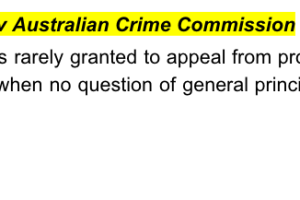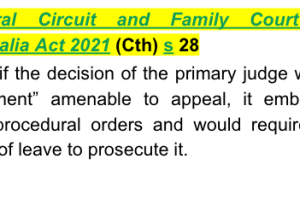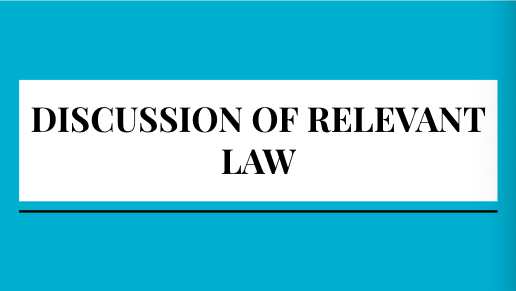- · 4851 friends
Father Appeals Decision to Appoint Single Expert, but is that decision an appealable judgement?
Falydn & Badenoch [2022] FedCFamC1A 170 (19 October 2022)
The primary judge made orders defining the instructions of a particular psychiatrist to provide expert opinion evidence. The appeal registrar rejected a Notice of Appeal for filing. The Court assessed whether the appealed orders appointing a single expert psychiatrist determined any legal right which one party could exert against the other.

Facts
On 26 September 2022, a judge of the Federal Circuit and Family Court of Australia (Division 2) made orders appointing and defining the instructions of a particular psychiatrist to provide expert opinion evidence as the single expert in proceedings litigated between the parties over an adolescent child under Pt VII of the Family Law Act 1975 (Cth) (“the Act”), it being an agreed position that there were “urgent and serious concerns about the child’s mental health and well-being” and single expert opinion evidence was required.
The parties had been unable to reach agreement about the person who should be appointed as the single expert and so the primary judge listed the matter for the discrete decision of that issue in September 2022. The father opposed the psychiatrist selected to fulfil the role of the single expert, apparently on grounds related to her area of expertise, her experience and also because interviews would have to be conducted by audio-visual link. The father proposed the appointment of a different psychiatrist, currently unavailable, whose selection would necessarily entail adjournment of the trial fixed for late November 2022 until he became available.
The father sought to file a Notice of Appeal from the orders of the primary judge, but the appeal registrar rejected it. In two emails sent to the father, he was advised his proposed appeal was incompetent because: "The determination to appoint a particular expert to assess the child and the consequential orders giving effect to that determination is not a “judgment” from which any appeal competently lies." The father disagreed with the appeal registrar’s decision and filed an Application for Review on 4 October 2022, seeking the review of the appeal registrar’s refusal to accept his Notice of Appeal for filing. The application ought have been brought in the form of an Application in an Appeal (rr 13.40(1)(b) and 13.40(2) of the Federal Circuit and Family Court of Australia (Family Law) Rules 2021 (Cth) (“the Rules”)), but the procedural irregularity is overlooked.
The father was unable to explain to the primary judge how his promotion of that particular psychiatrist could be reconciled with his assertion of the need to urgently finalise the proceedings. Only three psychiatrists were identified as being eligible to accept appointment as the single expert. The primary judge provided lengthy reasons for the psychiatrist selected. The amendment providing for appeals to be now brought from judgments instead of decrees should not be thought to represent an intended expansion of appellate jurisdiction over any “decision” made in the exercise of original jurisdiction.
Issue
Whether or not the appeal should be granted.

Applicable law
Family Law Act 1975 (Cth) Pt X, s 4 - provides that “decree” means decree, judgment or order and includes:
(a) an order dismissing an application; or (b) a refusal to make a decree or order.



Analysis
There is no room to impute any intention by the Parliament to overrule decades of jurisprudence emanating from the High Court of Australia about the constricted meaning of “judgment”.
No such express intention is evident within the legislation, particularly given the provisions of the Explanatory Memorandum. The inclusion of the word “decision” cannot rationally broaden the definition of “judgment” to such width that it covers any decision on any issue within the litigation – whether substantive, procedural or administrative – so as to qualify it as a judgment from which an appeal lies, either as of right or subject to the grant of leave to appeal. Rather, the word “decision” should be read commensurately with the other forms of defined judgment, covering only judicial decisions which are in some way decisive of litigants’ rights, even if only on an interim basis.
The primary judge merely made an interlocutory ruling on which one of three eligible psychiatrists would be appointed as the single expert. The ruling did not determine any legal right which one party could exert against the other. Neither party had the “right” to the appointment of a single expert, but once accepted a single expert should be appointed, neither had the “right” to the appointment of their preferred candidate nor the “right” to veto the other’s choice or the expert eventually selected. The decision was merely one about how the litigation would best be conducted to facilitate adjudication of the parties’ rights under Pt VII of the Act.
It remains possible the father will eventually be satisfied with the opinion evidence given by the single expert, but assuming he is not, he may successfully persuade the primary judge that such evidence should be given little or no weight. Any evidence ultimately given by the single expert is not binding upon the primary judge.
Conclusion
The Application for Review filed on 4 October 2022 is dismissed.













